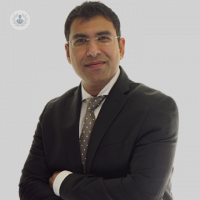SMILE laser eye surgery: Benefits, risks, and recovery
Autore:SMILE laser eye surgery, short for Small Incision Lenticule Extraction, is an innovative procedure designed to correct vision issues such as myopia (nearsightedness) and astigmatism. This minimally invasive surgery has been gaining popularity due to its precision and efficiency. In this article, esteemed consultant ophthalmologist Mr Prateek Agarwal will cover what SMILE laser eye surgery entails, its advantages, potential risks, and the expected recovery time to help you make an informed decision.

What is SMILE laser eye surgery?
SMILE laser eye surgery is a refractive surgery technique developed as an alternative to LASIK (Laser-Assisted In Situ Keratomileusis) and PRK (Photorefractive Keratectomy). It involves using a femtosecond laser to create a small, lens-shaped piece of tissue (lenticule) within the cornea. This lenticule is then removed through a tiny incision, reshaping the cornea and correcting refractive errors.
Procedure steps:
- Preparation: The eye is numbed with anesthetic drops.
- Laser application: A femtosecond laser creates a precise lenticule inside the cornea.
- Lenticule removal: The surgeon extracts the lenticule through a small, 2-4 mm incision.
- Reshaping the cornea: The removal of the lenticule changes the cornea's shape, improving vision.
What are the advantages of SMILE?
SMILE laser eye surgery offers several advantages over traditional LASIK and PRK:
- Minimally invasive: The procedure requires only a small incision, reducing the risk of complications and promoting faster healing.
- No corneal flap: Unlike LASIK, SMILE does not involve creating a corneal flap, which can reduce the risk of flap-related complications.
- Less dry eye: The smaller incision helps preserve corneal nerves, potentially leading to fewer issues with dry eye post-surgery.
- Precision and safety: The femtosecond laser used in SMILE offers high precision, making it a safe and effective option for many patients.
- Quick recovery: Most patients experience a rapid recovery of vision and can return to normal activities within a few days.
Are there any risks or complications?
As with any surgical procedure, SMILE laser eye surgery carries potential risks and complications, though they are relatively rare:
- Infection: As with any surgical procedure, there is a small risk of infection.
- Inflammation: Some patients may experience inflammation, which is usually treatable with medication.
- Under or overcorrection: In some cases, the desired vision correction may not be fully achieved, potentially necessitating additional treatment.
- Visual disturbances: Rarely, patients might experience glare, halos, or double vision, particularly in low-light conditions.
- Difficulty with enhancement: If further correction is needed, performing enhancement surgery can be more complex compared to LASIK.
How long does it take to recover?
Recovery from SMILE laser eye surgery is generally swift and straightforward:
- Immediate post-surgery: Vision may be blurry or hazy immediately after the procedure, but this typically improves within a few hours.
- First few days: Most patients experience significant improvement in vision within the first few days. Mild discomfort or a gritty sensation in the eye is normal but usually subsides quickly.
- One week: By the end of the first week, most patients can resume normal activities, including returning to work.
- Full recovery: Complete recovery, including stabilization of vision, can take several weeks to a few months. Regular follow-up appointments with your ophthalmologist will ensure your eyes are healing properly.
SMILE laser eye surgery is a groundbreaking procedure offering many benefits, such as being minimally invasive and providing a quick recovery time. While there are potential risks, they are uncommon, and most patients experience significant improvement in their vision. If you are considering SMILE, consult with a qualified ophthalmologist to determine if this procedure is right for you.
For more information on SMILE laser eye surgery, schedule a consultation with Mr Prateek Agarwal today via his Top Doctors profile.


